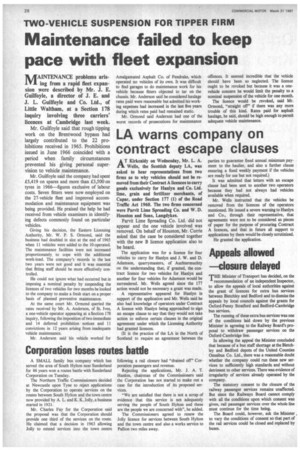LA warns company on contract escape clauses
Page 28

If you've noticed an error in this article please click here to report it so we can fix it.
A T Kirkcaldy on Wednesday, Mr. L. A. Wells, the Scottish deputy LA, was asked to hear representations from two firms as to why vehicles should not be removed from their Contract A licences to carry goods exclusively for Hanlyn and Co. Ltd. lime, grain and fertilizer merchants, of Cupar, under Section 177 (1) of the Road Traffic Act 1960. The two firms concerned were Parvit Lime Spreading Co. and W. D. Houston and Sons, Langdykes.
Parvit Lime Spreading Co. Ltd. did not appear and the one vehicle involved was removed. On behalf of Houston, Mr. Currie asked that the case be considered together with the new B licence application also to be heard.
The application was for a licence for four vehicles to carry for Hanlyn and J. W. and D. Adamson, quarrymasters, of Auchtermuchty on the understanding that, if granted, the contract licence for two vehicles for Hanlyn and another for four vehicles for Adamson would be surrendered. Mr. Wells agreed since the 177 action would not be necessary a grant was made.
A representative appeared for Hanlyn in support of the application and Mr. Wells said he also had knowledge of operators under Contract A licence with Hanlyn being approached to sign an escape clause to say that they would not take action to enforce certain clauses in the original agreement under which the Licensing Authority had granted licences.
(It is the practice of the LA in the North of Scotland to require an agreement between the
parties to guarantee fixed annual minimum payment to the haulier, and also a further clause ensuring a fixed weekly payment if the vehicles are ready for use but not required.)
It was admitted that letters with an escape clause had been sent to another two operators because they had not always had vehicles available when required.
Mr. Wells instructed that the vehicles be removed from the licences of the operators mentioned. He issued a severe warning to Hanlyn and Co., through their representative, that agreements were not to be considered as pieces of paper for the purpose of procuring Contract A licences, and that in future all support to applications by them would be closely scrutinized.
He granted the application.
















































































































